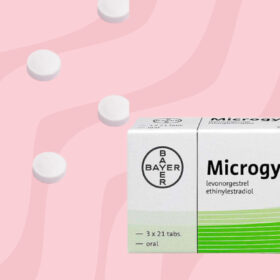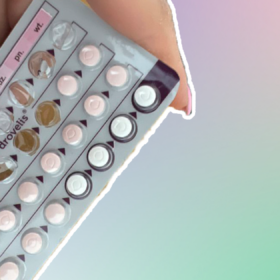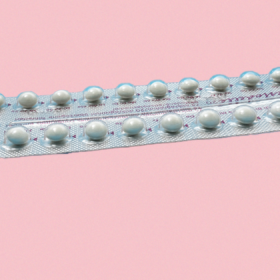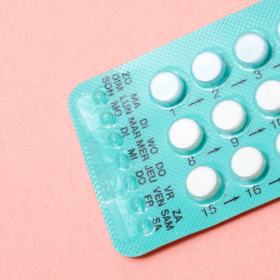
My contraceptive experience: Rigevidon vs Microgynon
Written by Leah Barron Stevens on Jul 12, 2020
Disclaimer: This blog has not been medically reviewed. The views expressed here are those of the writer and do not necessarily reflect those of The Lowdown or our medical team. For information about your contraception or the different methods available please check out our contraception pages.
Everyone’s journey with the contraceptive pill is different. For some it’s the best thing ever, while others find it wreaks havoc with their mental and physical health. It is quite common for their GPs to switch patients to another pill if they’ve been on the same one for a long time, containing exactly the same ingredients, sometimes at a lower cost. So is Rigevidon the same as Microgynon? Microgynon is a very common type of ‘starter’ pill that is often prescribed because it contains a standard dose of oestrogen and a progestogen with a lower risk of blood clots that other combined pills. It contains the same ingredients as Rigevidon and Ovranette and has been around and researched for years. Sometimes, switching between brands won’t have any impact on the person taking it. However some users have found that identical pills of different brands, i.e. containing the same ingredients, have caused significant changes to their moods. Here, Leah Barron Stevens shares her contraceptive journey.
Anxiety or the pill?
When I was 16 years old, I began my first course of oral contraceptives with a pill called Microgynon 30. Aged 19, I switched to Rigevidon. Around this time, I started noticing physical and emotional changes; it was not long after I chose to come off Rigevidon that I began to feel better.
Although I am quick to stress that my experience with both pills was largely positive, I feel that my story is worth sharing because it exemplifies an ambiguity faced by many other women in my life: we can’t always confidently distinguish between long term contraceptive treatments and other factors affecting mental and physical health. Given that the Sexual and Reproductive Health Services estimated 42% of UK females were using the pill in 2018, and that, in this same year, nearly 1 in 4 women reported suffering from mental illnesses, it’s fair to say that many other women will have found themselves living in the intersection of these data sets and wondering how one relates to the other.
Did my change in contraception contribute to a period of poor mental health? Was my nausea, fatigue and blurry sight spurred on by artificial hormones or simply the result of unrelated, social anxiety? Was it my counselling alone, or this alongside my decision to come off oral contraceptives completely, that allowed me to emotionally recover? I am still not sure of the right answers to these questions but hopefully, by sharing my experiences, I can give other females greater perspective with which to understand their own contraceptive journeys.
Going on the pill
When I initially went to see my doctor about contraception in 2013, I was in my first serious relationship and, like almost every other teenage girl having sex for the first time, I was confused about the great many varieties of contraception but even more petrified about the possibility of unplanned pregnancy. I don’t know whether my experiences were typical, but it’s worth noting that this initial appointment made me feel very uncomfortable. My doctor said little to reassure me that I was doing the right thing and asked if my parents knew that I was seeking contraception in what I found to be quite a derogatory tone.
I felt embarrassed, despite the fact that I was 16 and well within my rights to seek medical guidance on this issue alone, and consequently lacked the confidence to request the full range of information about my contraception options. I walked away with a prescription for Microgynon 30, which I used for the next three years.
Despite my initial anxiety, this proved to be a good decision for me. I did not experience any significant side effects and Microgynon 30 allowed me to live free of anxiety about pregnancy between the ages of 16 and 19.
My Transition to Rigevidon
Because I was happy with Microgynon 30 during this time, I did not initiate a change in oral contraceptive until I was prescribed Rigevidon instead, aged 19. I was told by my doctor that the pill contained exactly the same active ingredients as my previous pill; it was essentially just a cheaper version of the same thing.
On Rigevidon, I enjoyed similar benefits as before. I did, however, begin experiencing some minor physical symptoms, alongside more substantial emotional changes around this time. I found myself feeling more anxious and experiencing a more erratic mood, alongside physical changes such as nausea, blurry vision and fatigue. Of course, my personal circumstances had changed a lot between the ages of 16 and 19. By this point in my life, I was struggling increasingly with social anxiety. (You can see more on Rigevidon reviews here)
Looking back, many of the physical changes I experienced could merely have been indicative of my emotional state. However, I was also suspicious that my contraceptive switch could be playing part in my growing anxiety; although the active ingredients were the same, I wondered if it was possible that some inactive ingredient present in Rigevidon was causing noticeable changes in my body.
Coming off the pill
Because of my suspicions about Rigevidon and my desire to recover as soon as possible, I made the decision to come off the pill at the same time as having counselling for my anxiety. Soon afterwards, I found that my anxiety had become a lot more manageable and my physical symptoms had subsided too. Ever since this time, I have stopped taking contraceptive pills and have been a lot more comfortable knowing that I am no longer putting artificial hormones into my body.
Although I can’t be sure exactly how these hormones affected me to begin with, removing them from the equation makes me feel more in control of my mental health and my ability to read my own body. Even if the pill had never been affecting my mood, Rigevidon made it more difficult to confidently address the sources of my anxiety and, for that reason alone, it was beneficial to my recovery to stop taking it.
My Conclusion
On the whole, I feel that my contraceptive journey has been a fortunate one. Over the three years I used Microgynon 30 and Rigevidon, I was largely able to get on with life as normal, which I know is not the case for everybody. I am also aware that I am lucky to have had supportive boyfriends; if my boyfriend at the time had not reassured me in my decision to stop taking Rigevidon, then I may not have taken that step.
For many of my friends, combined oral contraceptives feel like a losing battle between unwanted side effects and their fear of getting pregnant. In the past, when I have searched for information online, I have been overwhelmed by the volume of traumatic accounts of combined oral contraceptives.
I felt that my story was important to share, not only because it provides a comparatively positive and ordinary account of Microgynon 30 and Rigevidon for those who are considering taking them, but because it highlights the complexity of evaluating oral contraceptives altogether. My experiences of contraception during these years are wrapped up in the rest of my life experiences, which makes it difficult to cast certain judgments. What I do feel certain about, however, is that the more women are able to share their own stories, the greater our collective understanding of oral contraceptives will be.

Remember, this is all subjective. Some people may be able to relate to Leah’s story and for others, their experience could be completely different. You can read more contraceptive journeys and reviews here. You can also buy Microgynon and the Rigevidon contraceptive pill directly from The Lowdown.
This blog is a part of The Lowdown’s My Contraceptive Journey series. Got an interesting contraception journey of your own? Get in touch with us via Instagram.
The views expressed here are those of the writer and do not necessarily reflect those of The Lowdown or our medical team. For information about your contraception or the different methods available please check out our contraception pages.






